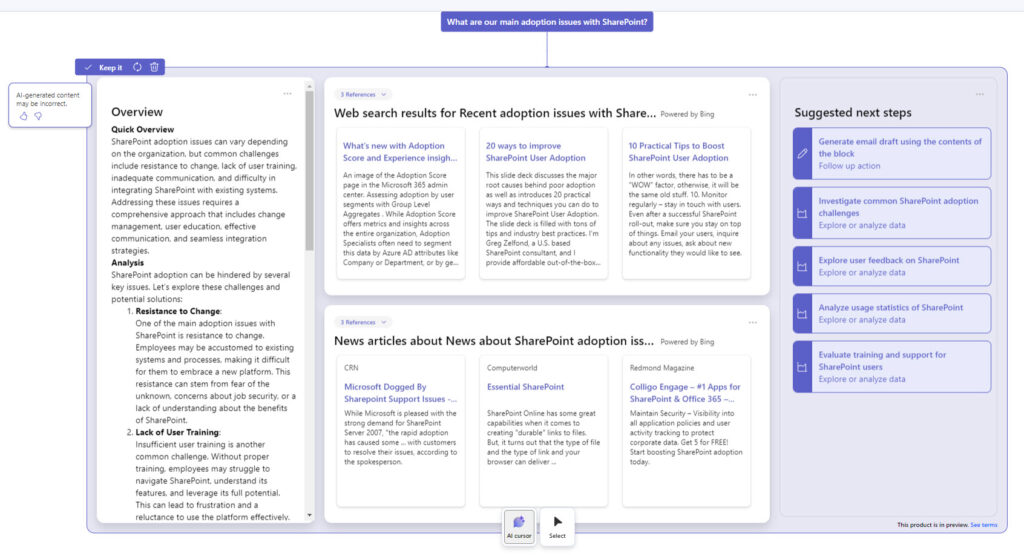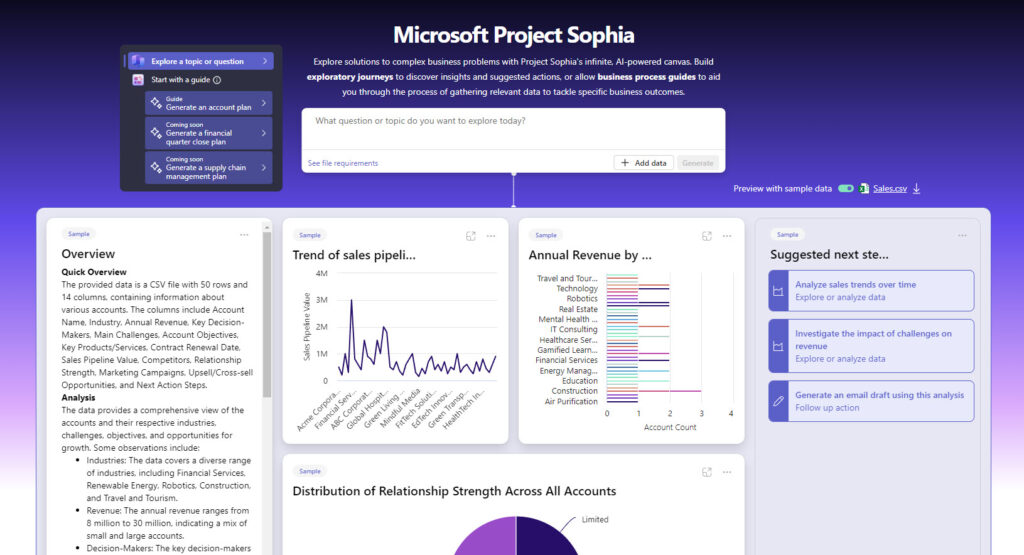What Is Project Sophia?
In a recent episode of the Collab Talk Podcast, I had the pleasure of sitting down with my good friend and fellow Microsoft MVP, Norm Young (@stormin_30), to discuss a revolutionary tool that’s poised to transform the business landscape: Project Sophia. As we navigate through the era of digital transformation, the convergence of technology, business, and innovation has never been more critical. Amidst this backdrop, Project Sophia emerges as a beacon of AI-powered insights, designed to redefine how we solve business problems.
Unveiling the Future of Business Intelligence
At its core, Project Sophia is an AI-powered Business Research Canvas, but it’s so much more than that. It represents a new frontier in business intelligence, enabling users to solve complex, cross-domain problems by interacting with data in ways previously unimaginable. This platform is not just about analyzing data; it’s about discovering insights and answering strategic questions that drive better outcomes.
Project Sophia integrates various data sources, allowing users to pose questions and hypotheses directly within its interface. Norm shared his firsthand experience, likening Project Sophia’s user experience to familiar tools like Microsoft Loop and OneNote, yet with a powerful twist. It combines the best of these platforms with elements of Jupyter notebooks, creating a unique space where data science meets business analysis.
The real magic of Project Sophia lies in its ability to make data interrogation intuitive. Users can import data, such as sales forecasts or market research, and interact with it to refine their hypotheses and uncover actionable insights. This capability not only simplifies the analytical process but also makes it accessible to a broader range of professionals, regardless of their technical expertise.
Practical Applications and Benefits
Our discussion explored the practical applications of Project Sophia, highlighting its potential to significantly enhance business analytics and decision-making processes. Norm’s experimentation with the platform revealed how it facilitates a more dynamic interaction with data, allowing for real-time hypothesis testing and scenario analysis. This interactivity is a game-changer, enabling businesses to pivot strategies quickly based on informed insights.

Project Sophia symbolizes a critical evolution in the application of AI within the business domain. It underscores a shift towards actionable analytics, where insights derived from AI are directly linked to tangible actions. This evolution is crucial for businesses aiming to stay ahead in a rapidly changing environment, offering a glimpse into a future where AI not only informs but also drives strategic decisions.
The Role of AI in Enhancing Collaboration and Productivity
Integrating AI tools like Project Sophia alongside collaborative platforms like Microsoft Teams can significantly enhance productivity and decision-making. The ability of AI to streamline workflows and generate efficient solutions can foster a culture of informed decision-making within organizations. This integration promises to transform collaboration by making it more data-driven and outcome-focused.
Project Sophia stands at the forefront of a major shift in how businesses approach problem-solving and decision-making. My discussion with Norm highlighted not only the capabilities of Project Sophia but also the broader implications of AI in business. As we look to the future, the role of AI in driving innovation and strategic insights cannot be overstated. Staying informed and adaptable is key to leveraging these emerging technologies effectively, ensuring that businesses can navigate the challenges and opportunities of the digital age with confidence.
In embracing tools like Project Sophia, we are not just adopting new technologies; we are opening the door to a future where data-driven decision-making underpins strategic success. The journey into this future is just beginning, and the possibilities are as vast as they are exciting.





